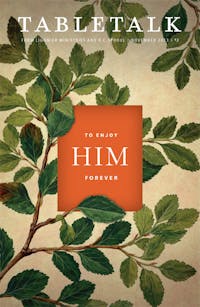
Request your free, three-month trial to Tabletalk magazine. You’ll receive the print issue monthly and gain immediate digital access to decades of archives. This trial is risk-free. No credit card required.
Try Tabletalk NowAlready receive Tabletalk magazine every month?
Verify your email address to gain unlimited access.
“That I may dwell in their midst” (Ex. 25:8). Israel’s tabernacle was a piece of astonishing architecture. Its whole purpose was to incarnate the immense and infinite presence of God. Until it was built, God’s presence was manifested at different times, at different places, and in different ways. To Adam and Eve, He revealed Himself as they “heard the sound of the Lord God walking in the garden” (Gen. 3:8). To Abraham He revealed Himself as a smoking fire pot and flaming torch (15:17). To Jacob He revealed Himself as a man with whom Jacob could wrestle (32:22–32). To Moses He revealed Himself as a burning bush that was not consumed (Ex. 3:2). And to all Israel He revealed Himself as a pillar of cloud by day and pillar of fire by night (13:21–22) during their wilderness journey and as a thick cloud, lightning and thunder, and trumpet blast (Ex. 19:9, 16).
Yet with the tabernacle there was something new. God’s presence was no longer like a visitor who came and went but like a resident who dwelled in a tent just as they did, in their midst. The tabernacle was His kingly house, then, complete with a door in the veil, curtains that covered it, a table with bread, a lamp for light, and the ark as His royal footstool.
One aspect of this newness was that now, the covenant people could enjoy the Lord’s presence in their midst in a way their forefathers could not. And this is highly instructive for Christians today as well, since the tabernacle was a type of God’s dwelling among us in the flesh: “And the Word became flesh and dwelt [the word dwelt can be translated “tabernacled”] among us, and we have seen his glory, glory as of the only Son from the Father, full of grace and truth” (John 1:14).
The Lord’s presence could only be enjoyed on His own terms. He revealed those terms to Moses, saying, “Exactly as I show you concerning the pattern of the tabernacle, and of all its furniture, so you shall make it” (Ex. 25:9). The specificity of the narrative (chap. 25–30) impresses this upon us. God reveals Himself to us, His people, and by means of His Word we may draw near to Him and come to know Him. As we observe all that the Lord has commanded us to be taught through the ministers of His Word, we can be sure that He is “with [us] always, to the end of the age” (Matt. 28:19–20).
The Lord’s presence was enjoyed as it was embodied in and mediated through His chosen servants, the priests. They could be related to with all of Israel’s senses as ministers of the Lord’s presence. Their clothing was meant to communicate the beauty and glory of the Lord to the people of the Lord as well (Ex. 28:2). And they offered up sacrifices for the intentional and unintentional sins of the people, for propitiation and expiation of their sins, as well as in thankfulness for the gracious activity of their God (Lev. 1–7). In fact, one of the striking things about the sacrificial system is how participatory it was. The people brought their own animals to be sacrificed, laid their hands upon the animals’ heads, and confessed their own sins. Further, with the sacrifice known as the peace offering, not only did the Lord “eat” His portion upon the altar and the priests get their share, but the people ate a portion of it as well (7:11–18).
The Lord gave the tabernacle to His people so that by means of His Word, the sacramental signs of grace in the priests and sacrifices, and their prayers offered there, He would dwell in their midst in grace and mercy. Wonderfully, He still dwells among us today (Eph. 2:18–22).
